I was fortunate enough in junior high and high school to have seen real life World War I veterans. Seeing real people like that made studying The Great War in the history books more immediate and tangible. That was over 20 years ago. So how do we keep these stories alive today when everyone from that era has passed? Enter Lord of the Rings guru Peter Jackson. They Shall Not Grow Old is his attempt to bridge that divide between history and modernity. It’s a mixed bag, but you can’t fault his efforts to help educate others on what that 4 year period was like for the young men involved in it.
Using archival footage from British soldiers fighting in The Great War, Jackson takes us from basic training, through the trials and tribulations of the Great War. The voices take us through the mindset of these young kids basically, and how their ideas about what war means changed as they experienced more of it, including brief thoughts about when they came home and what the world thought of their participation.
Jackson had to use WWI archival footage for this project; his instruction was “do something special with it.” Because filmmaking was in its infancy at the time, Jackson’s goal is to add color and sound to the footage, which helps make the story pop for sure. He also smartly starts with the grainy real footage in black and white before the war, and slowly adds in size, color and sound to build to the 4 years spent on the front lines. However, Jackson’s more subtle but effective trick is giving us “characters” to follow. It’s clear in much of the war footage that people are talking or chatting, but there’s no sound. So Jackson simply takes sound recordings from the era, and superimposes them over the chatty soldiers, making it much easier for the audience to connect to the footage, like they’re seeing a real life person, wholly formed.
By creating people to follow in his stories, Jackson can then use the recordings people from the era to craft the mindset of the boy soliders as the arc of his story. The boys’ mindsets are similar to movies we’ve seen before, with a tad of historical context. Unsure of their place in the new industrialized world, and with a tad of #FOMO, everyone signed up to be a part of the war effort because it’s what the government told them they should do. Basic training was the biggest joy, where you met tons of new people and developed a bond to a bunch of new people. Exciting! Then the mindset slowly starts to change. You hear the men matter of factly describe just how awful scenes at the front were, with all the dead bodies, flies, rats, ganggreen, meager food conditions, etc. However, even then, this was still sorta seen as a life experience that would make these boys into men, and death wasn’t really a certainty. Jackson intends to climax the movie with each soldier describing their charge into “no-man’s land” where they get massacred by machine guns, gas, artillery, etc. You can hear the sound in their voices, as calm as it may seem, as this being the turning point where all their worst fears come to the fore and death seems inevitable. So by the time they advance and capture some of the German forces, the men don’t despise the soldiers, they see the same wide eyed stare in the Germans that they must have had themselves. The too short coda at the end also puts these boys sort of in the same boat they were before the war, but with a much more jaded attitude, because the world around them doesn’t understand the soldiers, and has no use for them.
Within the frames of this project, Jackson does the best he can with They Shall Not Grow Old. The story still feels historical and far away, but through the director’s efforts The Great War does feel closer to our current times that it had in the past. More importantly, it paints a ubiquitous lesson for all young men desiring to join the military in hopes of killing enemies: war is hell, and you get no pleasure or joy from doing this. But, for the world’s sake I’m glad all those British soldiers “had a job to be done, and they just went on and did it,” for the sake of all of us.

